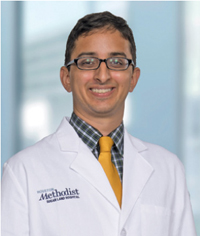Posted on Feb 1, 2022 in
MEDICAL FOCUS

Kirtan Nautiyal, M.D., Hematologist-Oncologist.
It may be hard to believe that colon cancer could develop in your 20s, 30s or 40s — but the risks are real. In 2020, the death of actor Chadwick Boseman at age 43 from colon cancer underscored the threat of colon cancer to younger adults. With colon cancer increasing in younger adults, it’s important to raise awareness about the risks and be proactive about prevention and early detection.
The American Cancer Society estimates that 12% of all new colon cancer cases in the U.S. will be diagnosed in patients younger than 50. “Lifestyle factors, such as having a poor diet and being overweight may be contributing to the increase in cases in younger adults; however, much is not known yet,” said Kirtan Nautiyal, M.D., board-certified hematologist-oncologist with Houston Methodist Oncology Partners at Sugar Land. “Adults ages 50 and older are still the highest risk group for colon cancer, but the risk of colon cancer for younger adults is rising faster.”
Colorectal Cancer Screening
Early screenings and detection of colorectal cancer make it possible to find the disease early when it’s more treatable. The National Cancer Institute recommends colorectal cancer screening, including a colonoscopy, starting at age 45 for people with an average risk of colon cancer. If you have an increased risk for colorectal cancer, screening should start before age 45. You may be at increased or high risk for colon cancer if you have:
- A strong family history of colon cancer
- A personal history of colorectal polyps
- A hereditary syndrome that increases your risk
- Inflammatory bowel disease, including ulcerative colitis or Crohn’s disease
- Radiation to your abdomen or pelvic area to treat a prior cancer.
How do you know if you have a strong family history of colon cancer? Having a first-degree relative (parent, sibling or child) diagnosed with colorectal cancer increases your risk. The risk goes up if your relative was diagnosed before age 50 or more than one relative was diagnosed.
Lower Your Risks
“Some of the factors that increase your risk for colon cancer are beyond your control,” said Nautiyal. “However, you have the power to make healthy lifestyle choices to help reduce your risk.” Nautiyal recommends the following:
• Eat a healthy diet. A healthy diet with plenty of fruits, vegetables and whole grains may help prevent colon cancer.
- Avoid highly processed foods. Lunch meats and foods containing added chemicals and preservatives may increase colon cancer risk.
- Exercise regularly. Having a sedentary lifestyle has been linked to colon cancer.
- Lose weight. Being overweight or obese can also increase the risk of colon cancer.
- Quit tobacco and limit alcohol. Both are linked to many cancers including colon cancer.
Watch For Warning Signs
Colon cancer is more likely to be overlooked in younger people and tends to be more aggressive, so it’s important to get checked out if you have concerns. Some of the warning signs include:
- Rectal bleeding
- A change in bowel habits
- Unusual abdominal pains
- Unexpected weight loss.
To schedule an appointment with Dr. Nautiyal or another hematologist-oncologist, call 281.276.5200. Visit houstonmethodist.org/sugarland to learn more about Houston Methodist Sugar Land Hospital.














